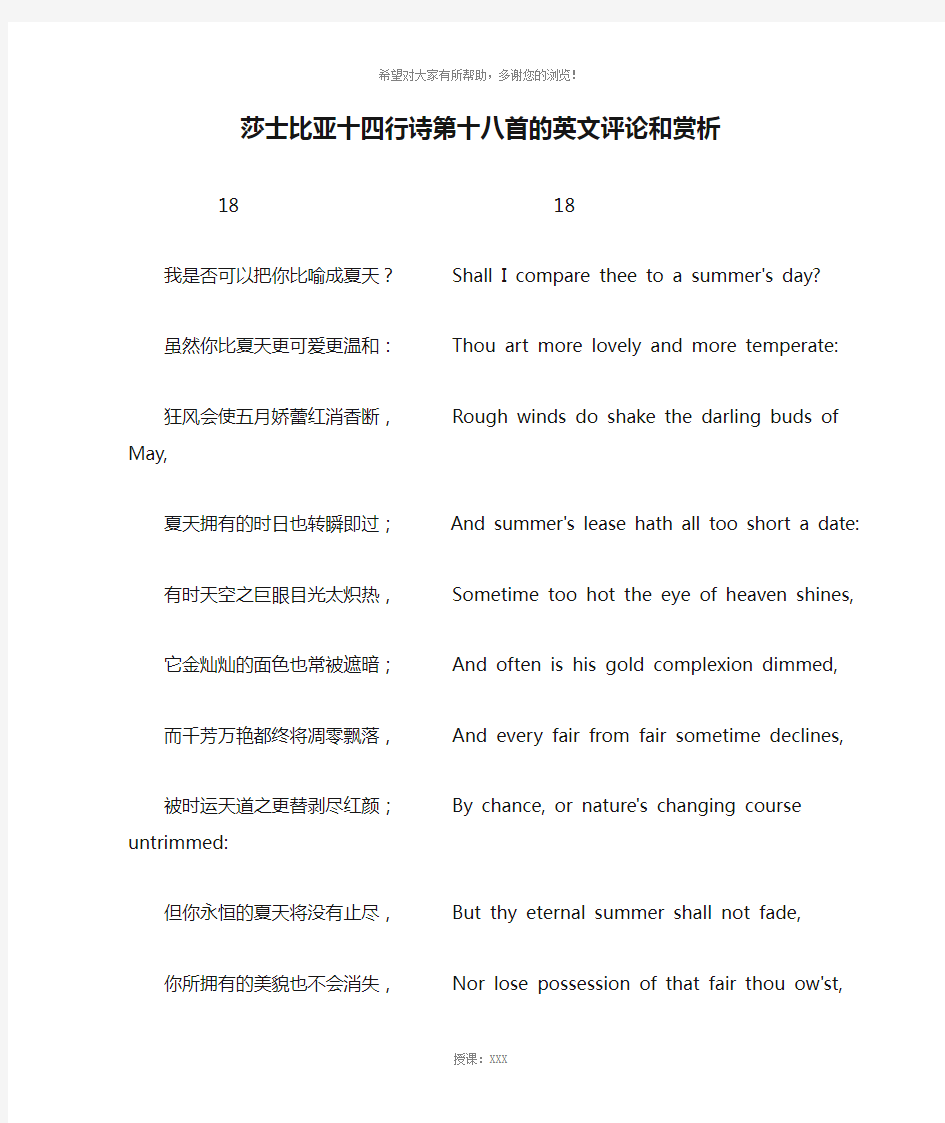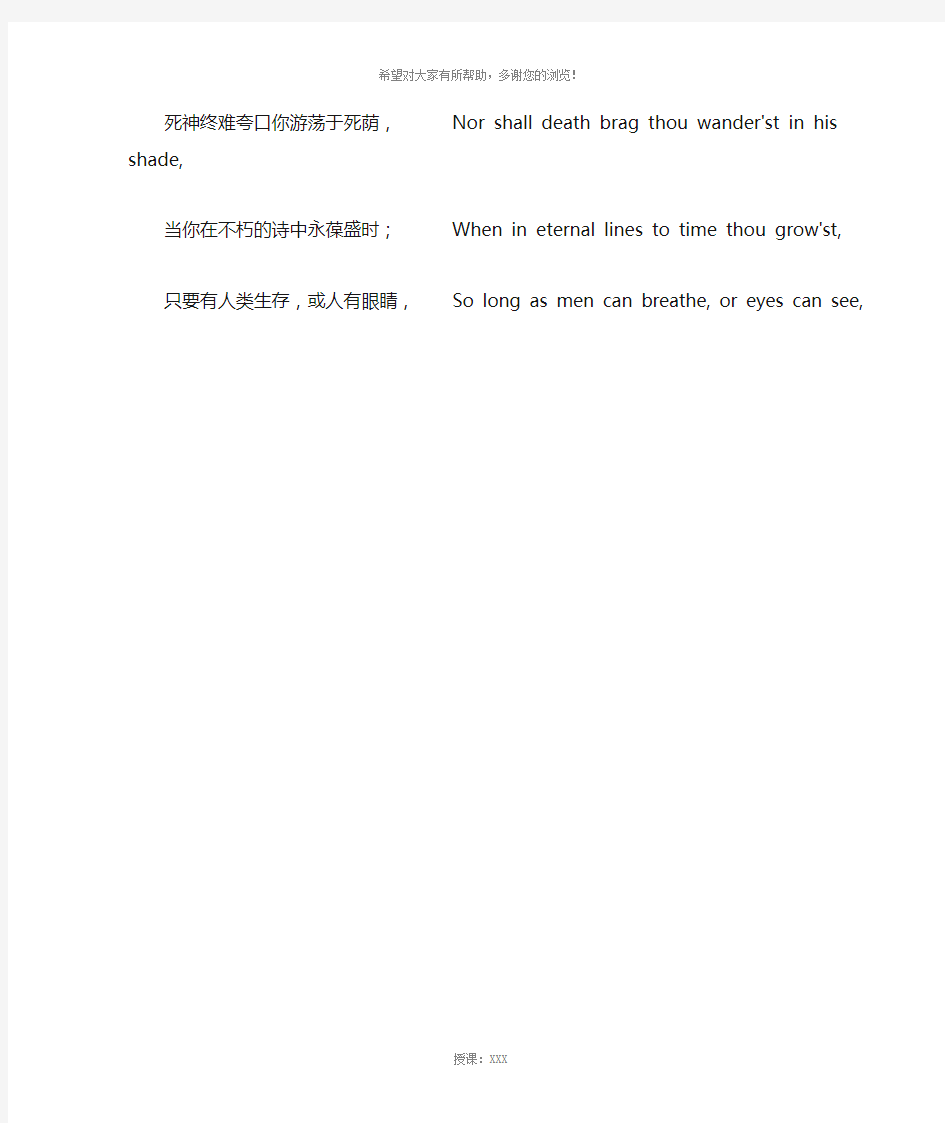莎士比亚十四行诗第十八首的英文评论和赏析[珍藏版】


莎士比亚十四行诗第十八首的英文评论和赏析
18 18
我是否可以把你比喻成夏天? Shall I compare thee to a summer's day?
虽然你比夏天更可爱更温和: Thou art more lovely and more temperate:
狂风会使五月娇蕾红消香断, Rough winds do shake the darling buds of May,
夏天拥有的时日也转瞬即过; And summer's lease hath all too short a date:
有时天空之巨眼目光太炽热, Sometime too hot the eye of heaven shines,
它金灿灿的面色也常被遮暗; And often is his gold complexion dimmed,
而千芳万艳都终将凋零飘落, And every fair from fair sometime declines,
被时运天道之更替剥尽红颜; By chance, or nature's changing course untrimmed:
但你永恒的夏天将没有止尽, But thy eternal summer shall not fade,
你所拥有的美貌也不会消失, Nor lose possession of that fair thou ow'st,
死神终难夸口你游荡于死荫, Nor shall death brag thou wander'st in his shade,
当你在不朽的诗中永葆盛时; When in eternal lines to time thou grow'st,
只要有人类生存,或人有眼睛, So long as men can breathe, or eyes can see,
我的诗就会流传并赋予你生命。 So long lives this, and this gives life to thee.
注:第11行语出《旧约?诗篇》第23篇第4节:“虽然我穿行于死荫之幽谷,但我不怕罹祸,因为你与我同在……”
英文赏析:
This is one of the most famous of all the sonnets, justifiably so. But it would be a mistake to take it entirely in isolation, for it links in with so many of the other sonnets through the themes of the descriptive power of verse; the ability of the poet to depict the fair youth adequately, or not; and the immortality conveyed through being hymned in these 'eternal lines'. It is noticeable that here the poet is full of confidence that his verse will live as long as there are people drawing breath upon the earth, whereas later he apologises for his poor wit and his humble lines which are inadequate to encompass all the youth's excellence. Now, perhaps in the early days of his love, there is no such self-doubt and the eternal summer of the youth is preserved forever in the poet's lines. The poem also works at a rather curious level of achieving its objective through dispraise. The summer's day is found to be lacking in so many respects (too short, too hot, too rough, sometimes too dingy), but curiously enough one is left with the abiding impression that 'the lovely boy' is in fact like a summer's day at its best, fair, warm, sunny, temperate, one of the darling buds of May, and that all his beauty has been wonderfully highlighted by the comparison。
这是整体赏析
1. Shall I compare thee to a summer's day?
This is taken usually to mean 'What if I were to compare thee etc?' The stock comparisons of the loved one to all the beauteous things in nature hover in the background throughout. One also remembers Wordsworth's lines:
We'll talk of sunshine and of song,
And summer days when we were young,
Sweet childish days which were as long
As twenty days are now.
Such reminiscences are indeed anachronistic, but with the recurrence of words such as 'summer', 'days', 'song', 'sweet', it is not difficult to see the permeating influence of the Sonnets on Wordsworth's verse.
2. Thou art more lovely and more temperate:
The youth's beauty is more perfect than the beauty of a summer day. more temperate - more gentle, more restrained, whereas the summer's day might have violent excesses in store, such as are about to be described.
3. Rough winds do shake the darling buds of May, May was a summer month in Shakespeare's time, because the calendar in use lagged behind the true sidereal calendar by at least a fortnight. darling buds of May - the beautiful, much loved buds of the early summer; favourite flowers.
4. And summer's lease hath all too short a date: Legal terminology. The summer holds a lease on part of the year, but the lease is too short, and has an early termination (date).
5. Sometime too hot the eye of heaven shines, Sometime = on occasion, sometimes;
the eye of heaven = the sun.
6. And often is his gold complexion dimmed, his gold complexion = his (the sun's) golden face. It would be dimmed by clouds and on overcast days generally.
7. And every fair from fair sometime declines, All beautiful things (every fair) occasionally become inferior in comparison with their essential previous state of beauty (from fair). They all decline from perfection.
8. By chance, or nature's changing course untrimmed:
By chance accidents, or by the fluctuating tides of nature, which are not subject to control, nature's changing course untrimmed.
untrimmed - this can refer to the ballast (trimming) on a ship which keeps it stable; or to a lack of ornament and decoration. The greater difficulty however is to decide which noun this adjectival participle should modify. Does it refer to nature, or chance, or every fair in the line above, or to the effect of nature's changing course? KDJ adds a comma after course, which probably has the effect of directing the word towards all possible antecedents. She points out that nature's changing course could refer to women's monthly courses, or menstruation, in which case every fair in the previous line would refer to every fair woman, with the implication that the youth is free of this cyclical curse, and is therefore more perfect.
9. But thy eternal summer shall not fade,
Referring forwards to the eternity promised by the ever living poet in the next few lines, through his verse.
10. Nor lose possession of that fair thou ow'st,
Nor shall it (your eternal summer) lose its hold on that beauty which you so richly possess. ow'st = ownest, possess.
By metonymy we understand 'nor shall you lose any of your beauty'.
11. Nor shall death brag thou wander'st in his shade,
Several half echoes here. The biblical ones are probably 'Oh death where is thy sting? Or grave thy victory?' implying that death normally boasts of his conquests over life. And Psalms 23.3.: 'Yea though I walk through the valley of the shadow of death I will fear no evil ' In classical literature the shades flitted helplessly in the underworld like gibbering ghosts. Shakespeare would have been familiar with this through Virgil's account of Aeneas' descent into the underworld in Aeneid Bk. VI.
12. When in eternal lines to time thou grow'st,
in eternal lines = in the undying lines of my verse. Perhaps with a reference to progeny, and lines of descent, but it seems that the procreation theme has already been abandoned.
to time thou grow'st - you keep pace with time, you grow as time grows.
13. So long as men can breathe, or eyes can see,
For as long as humans live and breathe upon the earth, for as long as there are seeing eyes on the eart.
14. So long lives this, and this gives life to thee.
That is how long these verses will live, celebrating you, and continually renewing your life. But one is left with a slight residual feeling that perhaps the youth's beauty will last no longer than a summer's day, despite the poet's proud boast.
这是逐句赏析
中文版:以莎氏十四行诗第18首为例,以往从未有人指出过它的缺点,但笔者根据教学实践得来的体会,认为它至少有两大缺点,一是在音韵方面,其韵脚、头韵和韵格均不同程度的破坏了诗歌的音美和形美;二是某些比喻和描述的平淡或离奇破坏了诗歌的意美。
一、音韵参差,破坏了音美和形美
全诗的基本格律是五音步抑扬格(iambic pentameter),包括三个四行组(quatrain)和一个对偶句(couplet),采用典型的莎氏十四行的韵式,即abab cdcd efef gg。但本诗音韵并不十分齐整。
在韵脚(end rhyme)方面,第二行的temperate与第四行的date押韵,但两个词的重音位置却不同,这一韵就既非阳韵(masculine rhyme)也非阴韵(feminine rhyme),显得不伦不类,与其它严整的韵对比,这一韵念起来令人颇感突兀,破坏了诗歌的音韵美。
头韵(alliteration)方面,第六和第七行都以And 起头,形成头韵,但这两个并列的简单陈述句从意义上看,造成了语意在同一水平上徘徊而不是递进,而且用相同的And起头使两句不仅在语意也在形式上显得拖沓而无变化,破坏了诗歌的音韵美和形式美。
韵格(meter)方面,五音步抑扬格的诗歌是常有破格的,特别是在诗歌首行的第一个音步,经常是前重音后轻音。适当的破格可使诗歌免于呆板,增加变化,使音韵更显其美。但过多的破格就会打乱诗歌的格式,使其音律显得零碎,给诗歌带来负面影响,本诗即是如此。第一行“Shall I compare thee to a summer’s day?”中的“thee to”是无法按轻重音的顺序来念的,第二行“Thou art more lovely and more temperate”中的两个more是强调,要念重音,因此这一行的韵格就不是抑扬格了。第六行“An d often is his gold complexion dimm’d”中前两个音步的轻重音位置是模糊的。第十行“Nor lose possession of that fair thou owest”中的第一个音步可以看作是破格,第十一行“Nor shall Death brag thou wander’st in his shade”中的“Nor shall Death brag”重音和轻音顺序应是“重轻重重”,也不是抑扬格。可见,本诗因为破格过多,格律形式有点混乱,诗歌齐整的音韵美受到了损害。实际上,学生也经常反映这首诗歌读起来有些地方很拗口,主要就是因为韵律破格太多所致。
二、比喻和描述有时平淡或离奇,破坏意美
诗歌之美,不仅体现在音美和形美上,而且还有语意层面的美。通过语法、词汇或使用比喻等,可以建构诗歌的意美。本诗中有美丽的语言,如“darling buds of May”(五月的嫩蕊)、“eternal summer”(长夏)、“thou wander’st in his shade”(在他的暗影里蹉跎),但也有平常的比喻和描述,如诗中将“你”比喻为“夏季”,把太阳比成“天上的眼睛”,有“金色的面容”,这当然不是平淡的描述,但至少也不是新鲜的。而说死神能“夸口”,这种拟人的手法多少有些平淡了。诗中又说夏天有“租期”,租期又“太短”,则令人感到有些陌生,难有美感了。时光匆匆是人人皆知的常识,诗中用复杂的表述来说明浅显的道理,很难令人感到亲切,这样的比喻并未达到增强表现力的效果。这种将简单复杂化从而使人产生隔膜的例子还有“nature’s changing course untrimm’d ”以及“that fair thou owest”。而“And every fair from fair”则让一般读者感到很抽象,难以理解。“So long as men can breathe or eyes can see”也是一句很平常的散文句。
以上所述,是莎氏十四行诗第18首在诗艺上的缺陷。当然诗中古雅的用词和句法也会给普通读者带来阅读上的不适,但这是古今语言演变造成的隔膜,并非诗歌本身的原因,正如其多个汉译文,现在看起来也有时代距离感一样。莎士比亚十四行诗第18首是一首经典诗歌,其美妙自不待言,但是从另一个角度检视和观察,认识其缺点和不足,以避免盲目吹捧和过度美化,应该是对待文学经典的更全面因而是更可取的方法。
(注:可编辑下载,若有不当之处,请指正,谢谢!)
